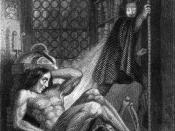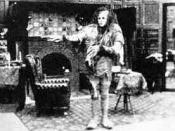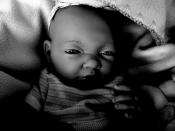Frankenstein or the monster: which is the real monster? Locke once debated on whether men were born evil or were made evil by the situations that developed around them. This has become a universally debated question, one that does not have a correct answer. In her novel Frankenstein Mary Shelley addresses this issue through her portrayal of the monster. The monster was not born an evil entity, but rather, the situations he faced and how he dealt with them bred it within him.
The monster is described like a child, innocent, eager to please and to learn. For instance, after the monster is first brought to life, Frankenstein describes it as a "miserable monster" with disgusting features and a terrifying face (43). Yet although the monster is hideously ugly and ghastly to look at, its smile betrays its motives. He is like an innocent child, reaching out to the first benevolent face it sees, stretching his hands out to be either held or pampered, but not fearing rejection.
Frankenstein understands the role he must play as creator of this monster due to his own experiences as a child. He relates his own role to that of his parents, who were ordained to bring him "up to good, whose future lot it was in their hands to direct to happiness or misery, according as they fulfilled their duties towards me" (19). Victor understands that he has certain duties to his monster, and that it is in his power to bestow to him happiness or misery. Yet he shirks this responsibility, leaving the monster to develop his own sense of right and wrong due to how he responds to the world around him.
The monster develops his own moral code from the situations that he experiences and the people he meets. It is not from birth, but from his interactions with the world that molds him into the true monster he will eventually become. After quitting his maker's house he ventures into the world, trying to understand all that he is thinking and feeling. His senses are strong and almost overwhelming, he is discovering the good and bad of hearing, touching, feeling and smelling. After having bad experiences with the people he meets along the way, he retires to the forest, cold, scared and miserably alone. He desperately needs some sort of being to relate to, someone he can interact with. This is when he meets the De Laceys.
The De Laceys seem like a nice, wholesome family. Although they have experienced much misfortune due to some unfortunate interaction with the law, they still are able to maintain a suitable family life, each member being ordained a specific task, while taking care of each other. The monster looks at them as "superior beings" and that "nothing could exceed the love and respect" within their household (91). The De Laceys become his surrogate family, and he finds himself endeavoring to perform good deeds for them, designating himself as the one to provide for these deserving people.
The monster does not have any delusions as to how these people would respond to him should he reveal himself. He compares himself to a "gentle ass, whose intentions were affectionate, although his manners were rude" (96). He realizes that they will at first reject him, yet he still harbors the hope that if he shows them how affectionate and well meaning he is, they will learn to see past his ghastly appearance, and recognize his good nature.
Their reaction to his appearance is the definining incident that, in his own words, "made me what I am" (91). When they attack him in terror and then refuse to return to the house, the monster finally states that he had a desire for destruction. He wishes to "tear up the trees, spread havoc and destruction around me, and then to have sat down and enjoyed the ruin" (117). Imagine having lived in the shadows for so long, admiring these virtuous, good natured people that were deemed as protectors. The monster lived for the De Laceys- for brave Felix, for the blind father and for gentle Agatha, and he learnt their language so he could better communicate and understand them. He provided for them by chopping the wood and he even suffered hunger by refusing to steal from their own scarce supply of food. He was an unseen beneficiary to these people and in the end he was rebuked and rebuffed and forced away from the only family he had ever known. It was not until that painful moment had he turned to the thoughts of murder and destruction.
These were vague concepts to him, actions which he has learnt about and even understood, but would never have endeavored to attempt. Before the De Lacey incident he "looked upon crime as a distant evil, benevolence and generosity were ever present before me, inciting within me a desire to become an actor in the busy scene" (108). In his naïve innocence the monster believes in good and the purifying power it holds. When he is rejected by these good people that he thought would be his safe haven from the ugly world, he declares "everlasting war" against human kind, especially on Victor Frankenstein. The monster begins to give himself over to evil.
Yet, even after that incident, and after declaring war on humankind, the monster endeavors to reach out the to the De Laceys once more, believing that he might have been a bit too hasty in his conclusions. Sadly, when he returns to the cottage, he finds it abandoned and desolate, with an angry Felix vowing to never return because of the danger he believes he is in. Frankenstein experiences a complete loss and break from humans at this moment. He has been abandoned, and he is now completely alone. Frankenstein is fully experiencing his loss and states: My protectors departed and had broken the only link that held me to the world. For the first time the feelings of revenge and hatred filled my bosom, and I did not strive to control them, but allowing myself to borne away by the stream, I bent my mind towards injury and death (118).
The last turning point for the monster is when he encounters the child related to Frankenstein. Frankenstein believes that because of the child's age that he will not know to fear the monster. He wishes to seize the boy and find an unprejudiced companion in him. Though, as the monster soon realizes, the child has already been taught how to react to this monster and screams for release. The monster realizes that this child is a relative of Frankenstein's, and thus he makes his final decision. The monster has finally crossed the line. Before he had simply entertained the idea of evil and murder, but had always crossed back onto the path of goodness and benevolence. Now he harshly and visciously murders the child, with great relish in the magnitude of his act.
The monster was not born an evil being. Both he and his creator realize that if the circumstances had been different, the monster may have enjoyed a better and fuller life. Frankenstein recognizes his duty when he states that he "bound towards him to assure...his happiness and well being" (193). After wreaking terror on all of Victor's loved ones and even Victor himself, the monster finds himself without cause to live and still utterly alone. He despises himself yet believes that he was not evil to begin with. He believes that humankind sinned against him, that he had been forever craving love and acceptance, yet he was spurned time and time again. His birth into an unjust world has transformed his innocent, loving nature into one as evil and twisted as his unfortunate appearance.





